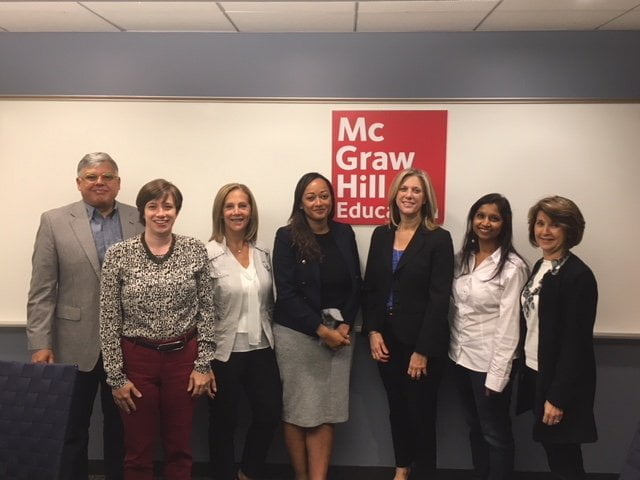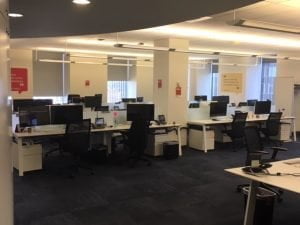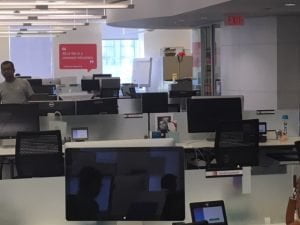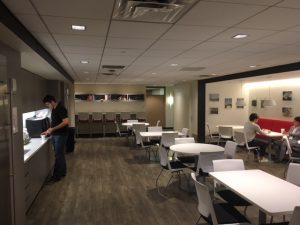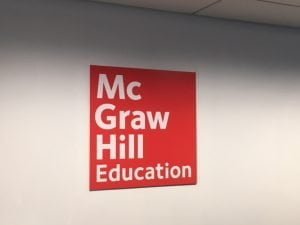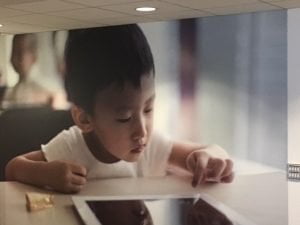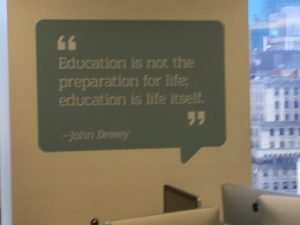Better Than Most is a regular feature of The Business of Giving, examining the best places to work among social good businesses and nonprofit organizations.
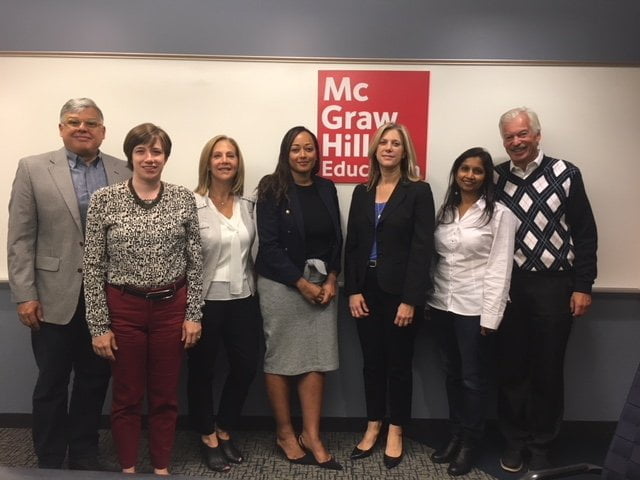
Denver: This evening, we will be going over to 2 Penn Plaza, right at the top of Penn Station in Manhattan, into the offices of McGraw-Hill Education. They are a purpose-driven business whose mission is to accelerate learning through intuitive, engaging, efficient, and effective experiences grounded in research. It’s a great place to work as you will hear from their passionate and dedicated team.
Donya: One of the biggest ways we do that is just really encouraging an entrepreneurial culture. We do that by letting employees come up with their own ideas and testing those ideas and that’s where data comes into play, just being able to let employees have great ideas and then see how we’re going to get those into the marketplace.
Jesse: And what I see is that there are different types of cultures across McGraw-Hill. So, we’ve got our sales culture. We’ve got a marketing culture and we’ve got the people that develop the textbooks and we have the administrative kind of culture. And I think the common thread between all of them is that there’s a bunch of good listeners out there and a bunch of really high-quality critical thinkers. And I think that combination really drives what I see as the true value of the company, and that is relying on other people around you. There are leaders here and leaders there, but everyone has a chance to go to bat and throw their ball out there and take a swing with ideas. Those ideas, I think, are what’s core to real innovation. All of us are kind of information freaks. We get emails. We read articles. We read studies. It all comes to us. But what comes out of that thinking after kind of turning through all that information is what really drives the company, I believe.
Donna Sturchio: But I think the really important part of connection here is our internet because most companies send a million emails. And here, we have our corporate internet. It’s called Spark, and that’s where we post all of our information. We really push content through there. And we see that we can gather data from there too just to see where our employees are really connecting and what’s important to them. We encourage everybody to social media platform. So, we encourage everybody to post. And what’s interesting about that too is it’s not a traditional – the internal communications would vet all of the content that’s going on to any website and push it out there. But here, everybody just speaks about what’s going on which is terrific because you really understand what’s happening in different parts of the business as opposed to just being fed information, and people are really driving content and also gathering data themselves because maybe there’s a question someone has, they push it out there and they can gather information.
Lalitha: Millions of student interacting in the wild. It’s not like a hundred students in the classroom, “Oh, let me see what works, what doesn’t work.” No. I can look at two and a half million students a year to see so I’m looking at procrastination, everybody does that. It’s not good. But again, to quantify what does it mean and to look at all these non-cognitive, metacognitive issues to identify and to let the instructor know, to let the student know “This is what’s going on, that’s what you need to do and this is what will happen otherwise.” So to support students at every, not only the cognitive things that we want them to learn, but a metacognitive level to have them develop good habits and to let them know that this is where they’re headed, just not where they should be going.
Melissa: First is when it comes to our culture, it sounded to me like the big thing is so part of our DNA that none of us called it out and that is the immense amount of passion that the people have working here. We just take that for granted that everybody brings it to the table. It is the most passionate group of people I’ve ever encountered. And when you put things out on Spark, on the platform that Donna mentioned, it’s really fascinating to see who in the organization responds to that and you’re reaching people globally about something you’ve had a thought about or you’re curious about. And people step up and if you post about some kind of achievement, people all around the world post congratulations and cheer you on and it can be very validating, really, quite frankly. So, that I thought was important to call out that it’s sort of our secret sauce, the passion that people have here
Christine: One was yours about Spark and I think what I appreciate so much about it is that, as someone who is a learning sciences researcher, it’s a place to really share ideas, and it’s really also a mechanism for breaking down silos. I think, for facilitating ideas that people otherwise might not hear about. And a specific example of that would be, we presented a lot of different academic conferences and a recent one was at a learning sciences conference on virtual reality, and we were talking about our use of simulations at McGraw-Hill Education. What was interesting about it is they posted it on Spark and we actually had someone from the creative team that said, “We would really love to hear about it and we would like to think about how do we apply or how do we begin thinking about applying virtual reality on our social studies program?” So, it was really sort of a great opportunity just to begin sparking discussion and really think about how do you take something that might be very sort of abstract right now and really begin applying it. So I think it’s a great opportunity to do that.
Donya: And what I think works out well about that is that employees know what’s expected of them. It’s very clear from all the messaging that comes from every part of the organization, these are the things that we really want to focus on this year and these are the ways that you can be successful. And what I always encourage my team to do is put those core competencies in a Word document and every time they do something that they feel kind of falls into one of those categories, to write it down so that then, at the end of the year, their review is pretty much done for them.
Donna: And I find that here, if you’re struggling with something, there’s always someone to go to, to get some assistance. Whether it’s someone in your group, outside of your group, you can always tap into someone for guidance. And I think, that’s a big deal because in other places, you might just flounder but here, it’s a very supportive culture in that way that you can always find a lifeline to say “Okay. I don’t know how to do this” or “I can’t figure out how to do this. Where to go for this information?” There’s always somebody to kind of help you out, which I think is great, too.
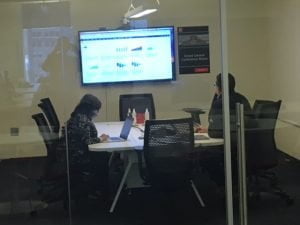 Melissa: There is, again, a structured new hire process where the new hire and the manager get pinged with notifications to ensure that they do all the great things that we know lead to a wonderful 90-day experience because we know from the data that first 90 days is really critical, right?
Melissa: There is, again, a structured new hire process where the new hire and the manager get pinged with notifications to ensure that they do all the great things that we know lead to a wonderful 90-day experience because we know from the data that first 90 days is really critical, right?
Part of that is a peer mentor. And a key part of that, because we’re a learning science company, is we have created courses in our own adapted platform that we provide to all new hires. So, from the moment they get their job offer, they have access to a course called Welcome to MHA. It’s video-based. So we’re driving them to our platform, they’re dogfooding our product as they’re signing on the dotted line. And they’re getting that opportunity to hear from all of our leaders. They see them. They hear their message, which is so important in a globally-dispersed workforce, as well as really learn about all the different business units within the company. So it gets them really excited. They get to say “Hey, look at this great company that I just joined,” and everybody in the family can come look because they can do it from home before they’ve even joined the organization.
Christine: So I think, we actually embrace failure in many ways because I think that we embrace it as an organization that tries out new approaches and tests different solutions. We think about ourselves as master problem solvers, so I think it’s kind of par for the course so we really do sort of want to embrace it. And going back to culture, I think you can really consider ourselves as a culture of continuous, relentless, and incremental improvement and I think that’s sort of a big part of it. So, I’d like to say that we embrace failure.

Denver: I want to thank Catherine Mathis for organizing all of this and to the people who participated in this piece: Donya Dickerson, Melissa Janis, Christine Gouveia, Jesse Gutierrez, Donna Sturchio, and Lalitha Agnihorti. If you would like to hear this again, see a copy of these comments or have a look at the pictures of the participants in the McGraw-Hill Education offices, just come to my website at denver-frederick.com.
The Business of Giving can be heard every Sunday evening between 6:00 p.m. and 7:00 p.m. Eastern on AM 970 The Answer in New York and on iHeartRadio. You can follow us @bizofgive on Twitter, @bizofgive on Instagram and at http://www.facebook.com/BusinessOfGiving

